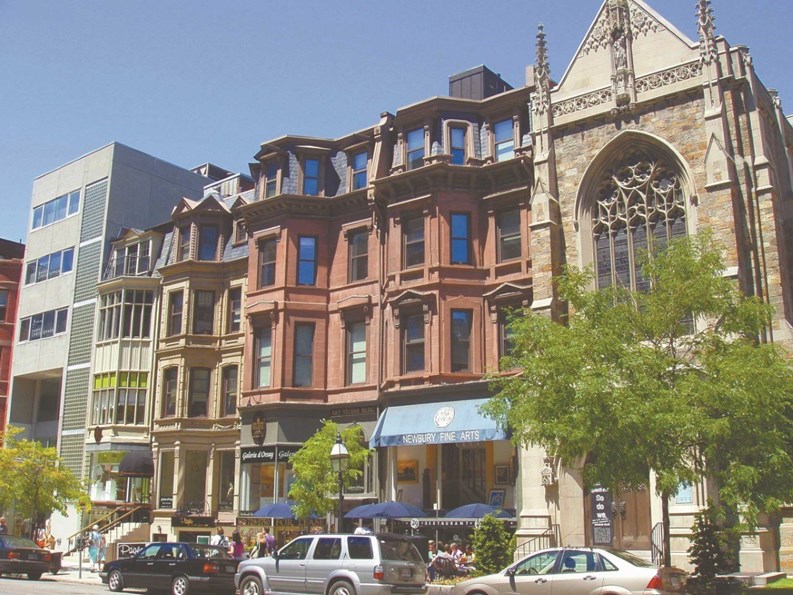Stores and other commercial businesses on the ground floor of an apartment building are a tradition in big cities. By contrast, when one looks at the typical suburban condo development, one must go to another location to shop—maybe to the mini-mall down the road. But in many New England condos, stores may often be found on the ground floor—supermarkets, restaurants, drugstores, clothing stores and more. Sometimes you’ll also find doctor’s or dentist’s offices.
Why are businesses seeking out space in condo buildings? A report by Banker & Tradesman, a Boston-based financial newspaper, says that prices for condo sales in Massachusetts rose by 11 percent in the last year, with many industry pros speculating that a high demand for condominiums may be the driving factor of the price increase. With more residents moving into condominium communities, retailers are looking to attract and expand business.
Glenn Montgomery, vice president of Brownstone Insurance in Norwell, Massachusetts, whose company insures more than 3,000 condo associations, observes that many buildings are converting space for commercial usage, to accommodate this growth in demand.
The relationship between the condo and the ground-floor business tenant is a complicated one. Having these stores on the ground floor is often seen as a plus by unit owners. But for management, it can raise questions from legalities to liabilities.
Desirable and Undesirable
What kind of business is the ideal commercial tenant? Answers vary and can depend on the building structure as well as the demographics.
Robert Masse, an agent with Massachusetts-based WT Phelan Insurance, says that an office would be the ideal commercial occupant. “They don’t have any flammables or any particularly risky operations. More higher-risk tenants would be restaurants or manufacturing,” he says.
Depending on the layout and structure of the building, the type of tenant who can move in may be restricted. Jack Facey, an attorney with the law firm of Kenlan, Schwiebert, Facey & Goss, PC in Rutland, Vermont, says that buildings that have several tenants that are, for instance, legal or medical offices, may not want anyone other than another office-type tenant.
“The best tenant would be one that is consistent with and complementary to the other tenants and didn’t interfere with what the other tenants were doing and didn’t cause upset or noise,” he says.
Many people feel that nightclubs and bars in particular are problematic because they’re open late at night, a factor that could disturb residents.
Of course, these are not hard and fast rules for everybody—a quick look around reveals plenty of residential buildings with restaurants or diners on the ground floor.
Facey says that those type of arrangements, called mixed use, are common, especially in the ski areas of New England. Having these kinds of tenants is a big convenience to residents, who are able to shop or run errands all in one place, he says.
Andrea Georgetti, regional property manager for Crowninshield Management Corp. in Peabody, Massachusetts, says that “higher risk” tenants can be perfectly fine as long as the space is able to accommodate the tenant. She says that one of her properties recently welcomed a hair salon, which had to install some ventilation for the dryers, but besides that, turned out to be safe and a good fit for the building.
What Kind of Insurance?
What kind of insurance do condos need if they have commercial tenants? Our experts have several answers.
“The condo association doesn’t need special insurance but it does affect their insurance, depending on the percentage of commercial occupancy to the total building. If you have a restaurant for instance, I would think that you would want to consider higher liability limits because of the foot traffic and the liquor,” says Masse.
“Both parties,” adds Montgomery, “need to rearrange the documents so they know who’s responsible.” This ensures that there are no gaps in coverage and all property is insured and covered in case of an accident or damage.
High-Risk Tenants
How does a higher-risk tenant on the premises affect the condo’s insurance? Many industry pros agree that a higher-risk tenant may restrict the number of insurance companies that are willing to write the insurance, which will in all probability make the premium higher.
Montgomery says that tenants such as restaurants or bars also create a lot of traffic and may blow unwanted fumes into the area, which some residents may not like.
“I had a meeting a couple days ago with a friend in downtown Boston and he owns two of the units and he’s arguing all the time with the restaurant down below. They have a restaurant, and they’re blowing fumes all the time, they have a lot of traffic and he gets concerned: What if somebody falls down at the restaurant? I said, “Well, you could be liable.” If somebody falls down and really injures themselves, they don’t just sue the restaurant, they sue the restaurant, the property manager, the condo association, you individually. You may or may not have any liability in the thing but you certainly are going to be named in it,” Montgomery told his friend.
Masse says that having a higher-risk tenant definitely impacts the master policy depending on what the tenant is, where they are located and what percentage of the total building they occupy.
“If you have 100 residential units and one small commercial unit, the master policy will be higher but it will still be eligible for most preferred condo-carrier programs. Once that percentage moves over 15 percent, it may become ineligible for many carriers. So then you do lose some coverage advantages that you may have with them over going to a different policy,” says Masse.
What happens if the condo building is damaged as a result of a fire or other mishap in the tenant’s business—say, a fire in a restaurant’s ventilation system?
“It’s no different than if it was an owner occupant than if it was a residential unit. If the unit is rented, it’s conceivable that the insurance carrier can subrogate if they determine that the tenant was negligent, causing the claim. It also depends how the bylaws are written. If it is an all-commercial association, you will probably not have all-in coverage,” says Masse.
“The claim is settled per the documents—the master policy is responsible,” says Montgomery. He gives an example of a fire that occurred at a grocery store that was part of a commercial building in Beacon Hill. “The master policy paid for all the damage except for the store’s personal contents, the commercial business property. It’s the same as if you’re in a condo, the condo pays for everything except for your clothes and furniture and everything in the building. So it’s still the responsibility of the master policy,” he says.
Once the Tenant is In
So far, we’ve just talked about the insurance needs of the building or development. But what about the needs of the commercial tenant itself? How is this affected when a business is within a residential building vs. being in its own building or in a commercial strip?
Masse says that coverage probably won’t change whether the tenant is in a residential building or a commercial strip. It will depend again, on how the bylaws are written.
Once the commercial tenant is in a residential building, experts say, it’s up to the condo board or manager to decide the appropriate insurance coverage for that tenant—with the assistance of the insurance broker, attorney and/or management company.
Another important issue is what type of insurance information the business tenant needs to provide to a building’s board and legal professionals before signing a lease.
Tenants that require permits from the local or state government (such as a restaurant) will need to make sure copies of those permits are provided to the association.
“A restaurant that is serving liquor, for instance, may be required to have Dram Shop coverage with their liability and to provide a copy of that policy to the condo association so that the association knows that liability is covered,” says Facey.
“Another extra that most declarations provide for with commercial tenants is that they are responsible for any permits for the particular use that is going on. So a restaurant in Vermont, for instance, is required to have a health department license, a Vermont liquor control license, and a labor and industry specialized permit for the stove hood and exhaust fumes. So there are a bunch of extra permits that tenants may have to get and most declarations will require that copies of all those permits are on file with the condo association,” he adds.
The Manager’s Role
What is the role of the building manager in all of this? In a mixed-use building that contains both resident shareholders/unit owners and commercial tenants, the manager acts as an intermediary between all owners and/or tenants, just like he or she does in a totally residential building.
The manager or management company also should be prepared to offer their expertise about insurance, city codes and regulations, alterations and other matters to the commercial tenants, and should always be accessible.
“The property manager maintains the common area and the commercial tenant contacts us just like any other unit owner with their problems and concerns,” says Georgetti.
Most of the time, when the business is a tenant of the condo/co-op building itself, the manager will have to deal with repair issues, rent collections and lease renewals, just like a manager does in a residential rental building. But when a building’s commercial space is owned by another entity, then leased to the store or business, the manager will have less of a role.
Thankfully, experts—insurance brokers, accountants, attorneys, condo and co-op organizations, and the managers themselves—are available to help buildings and developments deal with their commercial tenants. With the right type of management, a condo or co-op can find that having retail or commercial businesses located right inside their building is a convenience they can’t do without.
Raanan Geberer is a freelance writer and a frequent contributor to New England Condominium. Freelance writer Maggie Puniewska contributed to this article.







Leave a Comment